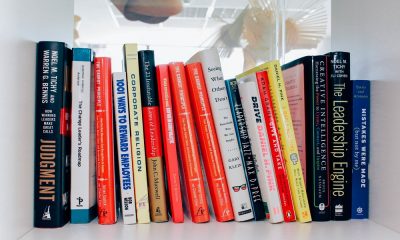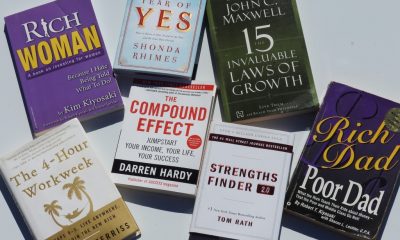GRIT: The Power of Passion and Perseverance – Book Review
What separates the determined, tenacious, and unstoppable winners from those who give up before they even try?
What separates the successful from the people who call it quits before truly giving it their best effort?
This is a question that psychologist Angela Duckworth tackles in her book GRIT: The Power of Passion and Perseverance.
Angela is a professor of psychology at the University of Pennsylvania.
And throughout this book she uses the latest psychology research to provide a powerful answer to the question that people have wondered about for thousands of years: What separates the most successful among us from the rest of the pack?
Heranswer is Grit.
Grit is a combination of both Passion and Perseverance.
The highest achievers in the world tend to have both.
These people are usually passionate about what they do.
They love the process, the journey, the day-to-day work, and the chase just as much as they love the results.
They are intensely interested in, curious about, and captivated by their craft.
They do what they do for its own sake.
Their work is inherently interesting to them.
They are “chasing something of unparalleled interest and importance.”
Passion does not necessarily mean that they love every single aspect, nuance, and detail of their craft.
There are definitely some aspects that they do find tedious, boring, irritating, painful, or frustrating.
But overall, the love, gratification, and enjoyment that they get from their work brings them back to it over and over.
Passion isn’t just about enjoying of your job.
It’s a form of guidance.
Angela describes passion as an internal guidance system that moves you forward in the direction you are supposed to go with your life.
It works like a compass that takes you to the places, work, people, and life that you were meant for.
Passion “guides you on your long and winding road to where, ultimately, you want to be.”
Passionis an essential component of grit that keeps you glued to the work for the longrun.
The second half of the formula for Grit is Perseverance.
The highest achievers in the world are relentless, determined, and hungry.
They persevere through difficulty, obstacles, and hardships.
They are never satisfied, never comfortable, and never complacent.
“Intheir own eyes, they are never good enough.”
Kaizen is a Japanese term that means constant and never-ending improvement.
People with perseverance embody Kaizen.
They constantly looking to challenge themselves, climb higher, improve, and get better at what they do.
So Grit is a combination of passion and perseverance—loving your work for its own sake and relentlessly seeking to get better, improve, climb higher, make progress, and attain more success.
Whenyou can incorporate both passion and never-ending perseverance into your workthere are no limits to what you can accomplish.
Angelastarts the book off by referring to some research she did on what separates themost resilient students at West Point from the ones who wind up dropping out.
West Point is also known as the United States Military Academy.
And it is one of the most selective schools in the country and in the world.
14,000 students apply to get into to West Point every single year.
In order to be considered, students need to have top scores on the SAT or ACT, top grades, and a nomination from a member of Congress, a United States President, or a Vice President.
And they need to get strong scores on a physical fitness assessment.
They need to be in great shape.
Out of those 14,000 applications, only 1200 students are actually accepted and enrolled.
Even after making it through that intense application process, 1 in 5 West Point cadets usually drop out at some point before graduating.
And a good percentage of them drop out during a brutal 7-week-training program called Beast Barracks that takes place during the first summer at West Point.
Beast Barracks is an academic and physical training program that goes from 5 a.m. to 10 p.m. at night every day for 2 months with almost no free time whatsoever, no weekends, and no outside contact with friends and family.
The Beast program is a demanding, brutal, rigorous, intense, and lonely process.
So Angela wanted to find out what types of students were most likely to stick with it versus those who dropped out.
She studied research done at West Point by others.
And she went there herself to attempt to answer the question.
You would think that the cadets with the highest scores on academic and physical tests would be the most likely to make it through.
But that wasn’t the case.
The students with the best scores and strongest physical fitness were just as likely to drop out as all the others.
It turned out that the biggest predictor of whether or not a student made it through West Point’s Beast Barracks training program was not talent, high scores, or great physical fitness.
It was Grit.
Angela created a questionnaire where half of the questions aimed to measure the strength of your perseverance and the other half aimed to measure how much passion you have.
She called it the Grit Scale.
And she discovered that the cadets at West Point who scored highest on the Grit Scale were the most likely to make it through the Beast training.
And she didn’t just stop there, she gave the Grit Scale questionnaire to people from many different domains including students, Army Special Operations trainees, sales professionals, and spelling bee contestants.
And Grit turned out to be the biggest deciding factor in who succeeded versus who gave up in every category she looked at.
Grit was the biggest factor in who succeeded in their sales careers, which students got their high school diplomas, and which students went on to get higher academic degrees.
The scores showed that adults who earned graduate degrees were grittier than those who earned undergraduate degrees from 4-year-colleges, who were in turn grittier than those who earned just a few college credits but did not go through with the entire degree.
Grit was even the difference-maker in how far kids went in the nationally televised Scripps Spelling Bee.
Angela came to the conclusion that our potential, talent, intelligence, and physical fitness do not determine our success.
Our grit does.
“Ourpotential is one thing. What we do with it is quite another.”
It’san empowering conclusion because Grit is something that you can attain. It’snot entirely fixed.
Both your genes and the environment you grew up in play a role in how much Grit you end up with.
But Grit is changeable.
You can build a gritty mindset towards your work, discover passion for what you do, and learn to become more determined.
Grit, and success by the same token, are both attainable.
But unfortunately, there is a big obstacle to embracing Grit that is standing in our way.
Unfortunately,when it comes to success, the society we live in worships and idolizes talentover any other quality.
People tend to believe that natural talent is the deciding factor in success.
Research shows that many people believe talent is more important than effort, even if they won’t admit it.
Television shows like America’s Got Talent, The X Factor, and Child Genius are prime examples of this tendency.
We love to single out and idolize that small group of people whom we think are more talented than everyone else.
Then we place them up on a pedestal.
Talentis an overused word in our culture. It is overemphasized.
If we can’t easily explain someone’s success, winning, and greatness, we default to saying they are talented, genius, and gifted.
It’s a much easier way to rationalize somebody’s greatness:
“When we can’t easily see how experience and training got someone to a level of excellence that is so clearly beyond the norm, we default to labeling that person a ‘natural.’”
There’s another reason why we focus so much on talent and natural ability.
It’s a coping mechanism that people use to protect themselves from the pain of accepting that they have not achieved everything that they are capable of.
We tend to label the most successful people among us as geniuses or super talented in order to discount effort so we can protect our own self-esteems and egos.
It’s an easy excuse for giving up on your own dreams, goals, and ideas.
It’s a justification and rationalization for quitting.
Angela points out that this cultural preoccupation with talent and idolization of natural ability is harmful and limiting because there isn’t enough spotlight on Grit in our society.
And when it comes to success, Grit is the number one quality that you need to have.
To drive this point home, Duckworth points to highly accomplished individuals who used effort, not natural talent, to climb the ladder of achievement.
John Irving is a novelist and screenwriter who has published multiple bestselling books and whose screenplay for the movie Cider House Rules won an Academy Award.
But when Irving was younger his future didn’t seem so promising.
He got a C– in high school English.
And his SAT verbal score was a 475 out of 800.
He struggled in school because he was severely dyslexic.
He had to read material very slowly with his finger, spend twice as long on his assignments, and put in twice the effort as the other students.
That work ethic he developed eventually led him down a path to a powerful career in literature and in Hollywood.
Irving credits his success to spending lots of time constantly re-writing his material and putting in twice the work to write his books and screenplays.
His disability became his advantage.
Natural talent had nothing to do with it.
Angela also points to Will Smith as an excellent example of a highly accomplished person who credits effort, work ethic, and perseverance over talent.
Will even said so himself: “I’ve never really viewed myself as particularly talented.
Where I excel is ridiculous, sickening work ethic.”
Working really hard just one day or one year isn’t what put Will Smith and John Irving on the path to greatness.
They became successful because they woke up and got to work day after day, month after month, and year after year.
Passion and Perseverance made them unique.
In regards the power of perseverance, Angela also refers to Harvard University study from 1940 where researchers put young men on a treadmill set at a very steep angle.
Then they cranked up the speed to see how long each person could last.
Decades later, they followed up with the young men to see how they had fared in life.
It turned out that how long the men lasted on the treadmill, how much perseverance they had, was a reliable predictor of how well they did in life.
That is one of the biggest takeaways that you can get from reading GRIT.
Talent, is not the most important ingredient in success.
Natural ability is not the difference-maker that pushes people to the top.
Embracing a Grit mindset is much more important.
If you’re looking to live your full potential and accomplish all of your dreams, stop comparing yourself to people who seem to be more talented that you are.
And start focusing on instilling yourself with more Grit.
How can you get more gritty?
So what is the best way to develop and embrace Grit in your career, your work, and your life?
How can you get more gritty?
There are 4 different ways to do so.
Angela identifies 4 characteristics that the grittiest people have in common: Interest, Practice, Purpose, and Hope.
These are 4 steps that you can take to make Grit your way of life.
The first step is Interest, the foundation for passion
Interest is the soil that passion grows from.
When you are interested in something, you feel captivated, fascinated, curious, and attracted to the topic that you are working on.
Unfortunately, being deeply interested in your job is not an experience that very many people in America and around the world are familiar with.
According to a 2014 Gallup poll, more than two thirds of American adults did not feel engaged by or excited about their jobs.
And worldwide, Gallup data shows that only 13% of people around the world consider themselves interested in their work.
Even though struggling to find your main interest or passion in life can get incredibly frustrating, it’s helpful to keep in mind that many people who love what they do started off in an entirely different career-field.
It’s not always clear-cut or straightforward.
Angela explains that connecting with your passion is a slow and steady process that happens in 3 stages: “passion for your work is a little bit of discovery, followed by a lot of development, and then a lifetime of deepening.”
The initial discovery of your interest is so subtle that you may not even what’s going on.
You just suddenly start gravitating to certain subject, topic, craft, or hobby without consciously realizing what’s happening.
Then after that initial spark of interest, it takes years of cultivation and development of an interest before it actually becomes your passion.
Once you have connected with that passion, you must continue to deepen it by staying committed to it.
So if you’re looking to find your passion, go out there and explore as many different interests as possible!
Try out as many hobbies, activities, and crafts as you can.
Explore your interests until eventually one of them becomes your passion.
The second step to Grit is Practice
Practice means showing up and getting to work, hammering away, and seeking to improve at your craft day after day, week after week, month after month, and year and year.
Angela describes some research on this subject by a psychologist named Anders Ericsson.
Anders Ericsson has spent his career studying how experts become great at what they do.
According to Ericsson’s research, it takes an average of ten thousand hours, roughly ten years, of practice to become a master at something.
This is the same ten-thousand-hour-rule that went viral when Malcolm Gladwell wrote about it in Outliers back in 2008.
Logging ten thousand hours of practice isn’t all you need to do to become an expert at what you do.
You need Deliberate Practice.
Deliberate Practice means setting stretch goals that expand your abilities, seeking to improve on your weaknesses, and seeking out challenges that you know you can’t meet yet.
Deliberate Practice means focusing more on what you’re doing wrong versus what you’re doing right and seeking to strengthen all the areas where you struggle.
Afteryou accomplish a stretch goal or turn a weakness into a strength, you move onto the next one.
Ifyou want to get on the path to Grit, start by committing to putting in at least10,000 hours of this Deliberate Practice.
Duckworth also touches on research done by another psychologist named Mihaly Csikszentmihalyi about a state of mind called Flow.
Flow is a mental state that top achievers often experience while they are busy work.
It’s a state of complete concentration where you lose track of time, lose your sense of self, and just get lost in the work.
Flow can only take place when you are working on something that you enjoy for its own sake.
Ifyou can combine Deliberate Practice with Flow, you’ll be well on your way toadopting a Grit mindset.
The third step to Grit is Purpose
Purpose is the intention to contribute to others with your work.
You can gain a sense of purpose in your career by doing your work that you believe matters and makes a positive impact in the lives of others.
Angela notes that people usually start out with a passion that they are interested for more selfish reasons.
And then later on, as they go deeper into the passion, they find a way to use it to help others.
So over time, that passion turns into purpose.
When you have a sense of purpose, you start to believe that all of your hard work, long days, and long nights are worth the struggle because your work helps improve the lives of other people.
Purpose becomes a source of motivation.
Angela explains that human beings are actually wired to gain happiness through helping others, giving, and seeking to contribute to the greater good, just as much as we are wired to seek out more selfish forms of pleasure.
So in addition to helping your motivation, purpose can be a powerful way to increase happiness as well.
People with Grit tend to see their work as a purpose, mission, or a calling.
And they believe their goals are connected to something greater than themselves like improving society, the world, or humanity—making the world a better place.
Duckworth refers to work done by a psychologist named Bill Damon who has made purpose the main focus of his career.
Damon explains that the best way to find purpose is by stumbling across a problem that needs solving, seeing some pain in the world that needs healing, and realizing that you personally can do something to make a difference in that area.
The last, but not least, step to attaining a Grit mindset is Hope
Hope means having faith, staying optimistic, and believing that you will win.
People with Grit tend to explain events and situations in their lives optimistically.
They choose a hopeful outlook and optimistic explanation for the things that happen to them in their lives.
Angela describes how she gave out questionnaires to 400 Teach for America teachers that aimed to measure their grit, optimism, and happiness.
When she checked back in with them a year later, the data showed that the most optimistic teachers were also grittier and happier.
These teachers with the most optimism, grit, and happiness were also more successful with helping their students achieve more during the school year.
Carol Dweck is a psychologist who has done a lot of investigation into the power of an optimistic mindset.
According to Carol, there are two different types of mentalities that can play a huge role in how well you do in life: the more pessimistic Fixed Mindset versus the optimistic Growth Mindset.
The Fixed Mindset means you believe you are born with a set amount of intelligence, talent, and competence that you can never change.
The Growth Mindset is a belief that with effort and application, you can change and grow your intelligence, talent, and ability.
The Growth Mindset and Grit go hand in hand.
People who embrace the growth mindset tend to be more determined, persistent, resilient, and successful than those who don’t.
So if you’re looking to instill more Grit in yourself, be more optimistic!
When something happens to you, good or bad, explain it with a positive outlook—no matter what it is.
And embrace the Growth Mindset.
Keep in mind that according to research, the human brain is very adaptive and flexible.
Your brain changes when you learn and master something new.
Your IQ scores and intelligence are not fixed throughout the human lifespan.
You can change and improve your intelligence, IQ score, abilities, and talents. You can become better.
TheSecret to Success and the Pathway to True Happiness
If there is one secret to success, Duckworth makes a strong case that it has to be grit.
Grit is what allows students high school students, college students, graduate school students, West Point cadets, Army Special Operations trainees, spelling bee contestants, sales professionals, and people from all walks of life to accomplish huge goals and rise to the top of their fields.
Angela Duckworth’s book proves with research that, contrary to popular belief, greatness is not about talent.
It’s about passion and perseverance.
It’s about loving the process more than the results and attacking your work with a relentless perseverance that never dies.
Andit all starts by incorporating these 4 building blocks into your daily routine:
- Interest
- Practice
- Purpose
- Hope
This book is very eye-opening and empowering for anyone who is looking to get on the path to greatness.
But Grit is not all about success.
It’s about happiness too.
Duckworth concludes her book by going over some survey data that shows how Grit can increase happiness, health, and wellbeing, in addition to boosting your achievement.
Angela found that people with more grit tend to have higher levels of well-being, life satisfaction, and happiness.
So basedon the research discussed in this book, it makes perfect sense that someonelike Will Smith—who credits his success to a “ridiculous, sickening work ethic”—alsoseems to be one of the happiest people in the world.
Gritis the key to rising to the top of your field while maintaining really highlevels of happiness and life-satisfaction at the same time.
I have not covered all of the information or all of the chapters of this book.
So be sure to check out GRIT: The Power of Passion and Perseveranceto learn more!
And if you enjoyed this book review and you are looking to learn more key lessons and insights from all of the best self-development and non-fiction books without sacrificing too much time from your schedule, try Blinkist.
Blinkist is a service that provides quick breakdowns of the key ideas and insights from the world’s best books within 15 minutes of text and audio.











